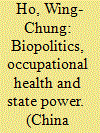| Srl | Item |
| 1 |
ID:
141100


|
|
|
|
|
| Summary/Abstract |
This article endeavours to address the experience of Chinese workers with occupational disease as an instantiation of Agamben's notion of homo sacer – the ultimate biopolitical subject whose life is located outside the “normal” political, economic and cultural practices and, hence, is rendered largely silent and unintelligible in the public realm. It argues that the victimization of the occupationally sick worker has become almost a blind spot at the centre of governmentality insofar as the specific set of social regulations and power relations has created a “double ambivalence” among the victims who are constantly and disturbingly caught in between the public and private, the productive and unproductive, and the culturally normative and the culturally deviant. Such experiences of marginality contribute to the understanding of the biopolitical nature of contemporary Chinese state power, which adopts extensive “stability maintenance” (weiwen) measures to reduce resisters to a state of “bare life” susceptible to the rule of exception.
|
|
|
|
|
|
|
|
|
|
|
|
|
|
|
|
| 2 |
ID:
163767


|
|
|
|
|
| Summary/Abstract |
In July and August 2010, a series of spontaneous “defend-my-mother-tongue” protests took place in Guangzhou. At its climax, thousands of protestors took to the streets to oppose a government proposal to switch local television broadcasts from Cantonese to Mandarin. Unlike other recent mass incidents in China, the “Defend Cantonese” protests mainly involved a place-based identity politics through which participants purported to support maintenance of Cantonese culture without explicit political and material demands. Based on the testimonies of dozens of participants and witnesses, the authors identify three sets of schematic dichotomies that framed the protests: namely, south versus north, local differences versus national uniformity, and conserving traditional Guangzhou versus urban redevelopment. It is argued that underpinning the language movement’s cultural outlook was the participants’ discontent with current politics and distribution of resources. The cultural packaging constitutes a specific tactic through which the actors resisted the authoritarian regime without triggering violent suppression.
|
|
|
|
|
|
|
|
|
|
|
|
|
|
|
|
| 3 |
ID:
123700


|
|
|
|
|
| Publication |
2013.
|
| Summary/Abstract |
The past two decades have witnessed increasing use of the concept of 'bureaucratic capitalism' to explain various endemic problems in China, including corruption and social inequalities. Yet, scant attention has been paid to the rise of key bureaucratic capitalists and the state corporations under their control. Neither has there been adequate discussion of the recent form of bureaucratic capitalism in contradistinction to that of the previous forms evolving in the republican and early reform periods. In question therefore is a small circle of bureaucratic bourgeoisie who are children, close relatives or protégés of top political leaders. They have come to control key state-corporation apparatuses, and some of whom possess close ties with the military. In conclusion, the future implications of this emergent form of bureaucratic capitalism on Chinese politics will also be discussed.
|
|
|
|
|
|
|
|
|
|
|
|
|
|
|
|